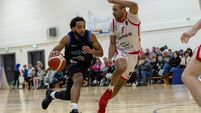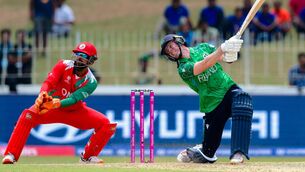Forwards not backwards for Joe Ward

oe Ward is where he should have been four years ago, but for a controversial Turkish derailment.
Trabzon was once a key link on the ancient chain that was the famous Silk Road. It again proved to be a profitable trading post for the locals when it hosted the last round of Olympic boxing qualifiers before the London Games four years ago.
Six Turkish boys qualified for the big show from that week’s business in the historic Black Sea port. None would come close to leaving a footprint on the podium at the ExCel Arena but smelling a rat is one thing in these circumstances, proving it is a rat quite another.
Boxing is littered with these stories. Billy Walsh and his team knew the lay of the land when they pitched up in Trabzon that time.
Everyone did. All you could do was hope and pray that you avoided the home team or, if not, that you won so well as to exterminate any reasonable doubt.
Joe Ward thought he’d done just that when he met Baham Muzaffer in the last 16 of the light heavyweight division. He wasn’t alone, but the judges went inexplicably in favour of the Turk and that was Ward’s Olympic ambition lost in transit for another four years.
Not for the first time, it was a photo that captured the moment best.
Ward’s face caught somewhere between mystification and disgust. The eyes glazed and rooted to a distant corner as an almost giddy Muzaffer manoeuvred to embrace his opponent. The Turkish flags hanging behind them at least putting some context on the inexplicable.
He coulda been a contender in London. He could have stood on that podium. Should have been. Just 18 at the time and already a World Junior Light Middleweight, a World Youth Middleweight champion and a gold medallist at the European Amateurs.
Youth and the promise of other opportunities were no defence against a blow so heavy.
“At that time you feel like four years is never going to come around,” he says ahead of his belated Olympic bow in Rio, “and especially the way it happened to me. I have good people around me.
"They always believed in me and they told me to stick at it and that it would come around and I would qualify.
“That’s what I did and I turned down a lot of big professional offers just to be here. This is where all those sacrifices, not to turn professional, come good.
"I’m representing Ireland at an Olympic Games. It’s always been my dream and now I’ll be able to say that I’ve done it. It’ll be great to sit back and take it all in.”
Walsh was as disgusted as anyone by what everyone considered to be a miscarriage of justice but the then head coach did point out at the time that this had been Ward’s second shot at making London. Ultimately, even an appeal to the Court of Arbitration for Sport hadn’t been enough.
That lesson – not to leave himself so open to misfortune – has been heeded.
Ward’s place in Rio was confirmed with ten months to spare and he did it by outclassing an Uzbek boxer seven years his senior in the semi-final of the World Championships in Doha where he added a silver to the bronze claimed at the same event in Almaty two years earlier.
It has all made for a relaxed and considered build-up. The immediate reward was a few months off duty and time to spend with his young family and the months since have been spent honing his skills and fitness in camps from Abbotstown to Assisi to Azerbaijan.
The expectation is that Rio Joe will be even better than London Joe would have been.
“I don’t know about being better. I know I am more mature,” says Ward who has had to grow up quicker than most his age given he is a dad to young children. “You always learn and realise what you have to do to be successful and how much effort you have to put into it as well.
“When you are younger you kind of just take it for granted and you don’t understand that it’s not like a light switch in that you can’t just turn it on and off. You have to put in the long hours and the hard work to get to an Olympic Games.”
He’ll approach it as he has done every other event. Ward isn’t the type to fret. Laid-back is his own setting. Only he can equate the 2012 Youth Olympics in Singapore with the gargantuan operation that will be Rio 2016 and make it sound plausible. As just another gig.
“Sure it’ll be grand when I get there,” he says. “I’m in the ring long enough.” That’s Ward. He’s no Mick Conlan.
The Belfast boxer has proclaimed time and again that he will come back from Brazil with a bantamweight gold medal to go along with the one he claimed at those World Championships in Doha last October. Ward is more measured in his words.
Their rankings both merit confidence. Conlan flew to South America late last month as the top-ranked bantam in the world. Ward is third in the light heavyweight category, behind Julio Cesar la Cruz Peraza of Cuba and Kazahkstan’s Adilbek Niyazymbeto.
Cruz he knows well.
It was the Cuban who got the better of the Moate fighter at the Worlds in Almaty and Doha and that Olympic title is the only major honour that evades the 26-year old who suffered a shock defeat to Brazilian southpaw Yamaguchi Falcao in the last eight in London.
That makes two of them with something to prove.
And that extends beyond Ward in Ireland’s case. Boxing bestrides this country’s Olympic story like a Gulliver in Lilliput but the collection of medals has lacked a golden shine. That was a central tenet of Billy Walsh’s stewardship before he departed for America.
Walsh’s ambition was for Ireland to be the best boxing nation in the world. To do that would require not just a deeper well of elite talent but an ability to convert Ireland’s sprinkle of silvers and bronzes into gold.
Katie Taylor’s success four years ago, and Conlan’s achievement in becoming the first Irishman to go all the way at the Worlds last year, is a start. But only that. Ireland, for all the progress, is still one of the best nations in the world. One of.
If Sports Illustrated is right then Taylor and Conlan will claim gold in Rio with Ward and Michael O’Reilly winning silvers and Paddy Barnes adding a third bronze to his collection: in all, one more than London and a haul that would have bumped them from fifth in the table to second in 2012.
They aren’t all that far away.
“We are getting closer to it,” says Ward. “For years we were scraping one bronze medal, if we were lucky, in an Olympic Games. Now we are coming home with three or four medals every time. This time is the time that we can push that little bit further and grab that gold medal. We know what it is like to come back with silvers with the likes of Kenny (Egan) and John Joe Nevin and people like that.
“None of us lads in the High Performance have witnessed what it was like to come home with that (Olympic) gold medal that Michael Carruth came back with and that can change you for life and do wonderful things for you. There isn’t just one of us who can come back with that gold medal, there’s two or three of us than can do it.”
And what of Ward beyond that?
Reach his potential in Brazil and this most talented of fighters will inevitably find himself parsing through much more attractive professional offers than those he rejected in 2012. Especially since he has shown an aptitude for the pro game before.
Stints in the World Series of Boxing and APB, both semi-professional concepts which have served to blur the lines between the amateur and pro games in recent years, have already acclimatised him to the rival code and he has expressed a liking for the longer contests in the past.
“I won’t make any statements yet about what I’m going to do and not going to do. I want to enjoy (Rio), see how it goes. I’ll make my own decision on what I am going to do after that then.
"Is it time to go professional or time to stay amateur? I’m still young. I’m still only 22 years old. There’s a bit of time on my hands and hopefully I’ll make the right decision after it.”
It will be a surprise if he doesn’t do so with an Olympic medal around his neck.













